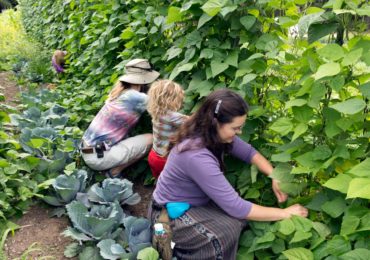 Five-year-old Kavi Ostrom announced one day to her mother, “These plants aren’t doing well because we haven’t put enough compost on them.” Maia Ostrom said, laughing, “I’m pretty sure that Kavi will be running the farm soon.”
Five-year-old Kavi Ostrom announced one day to her mother, “These plants aren’t doing well because we haven’t put enough compost on them.” Maia Ostrom said, laughing, “I’m pretty sure that Kavi will be running the farm soon.”
Maia Ostrom and her husband, Erik, owners of Dusk to Dawn Farm near Poulsbo, are part of a new generation who is raising young children on small farms. They are among the committed farmers you get to know at the local farmers markets.
How do these families manage the many labor-intensive hours of farming along with the challenges of caring for little ones?
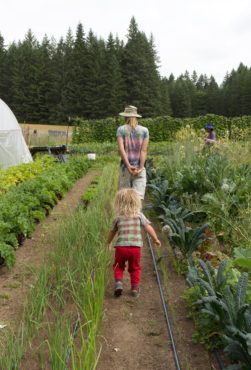 Three local families, with 5- or 6-acre farms each, shared their experiences of juggling farming and childcare, what drew them to farming to begin with, and the challenges of running a small farm in 21st century Kitsap County. They spoke also about their role in the local economy, the ways that small farms support the community and how they are supported in return.
Three local families, with 5- or 6-acre farms each, shared their experiences of juggling farming and childcare, what drew them to farming to begin with, and the challenges of running a small farm in 21st century Kitsap County. They spoke also about their role in the local economy, the ways that small farms support the community and how they are supported in return.
The Farmers
In addition to 5-year-old daughter Kavi, the Ostrums have a 2-year-old son, Rowan. They purchased their farm in 2016.
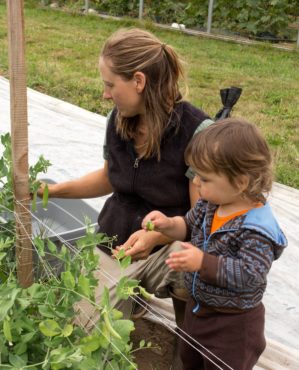 The Steege-Jackson family have owned Around the Table Farm since 2010. They are father Aaron, mother Dana and two sons, Wendell (age 5) and Alder (age 2).
The Steege-Jackson family have owned Around the Table Farm since 2010. They are father Aaron, mother Dana and two sons, Wendell (age 5) and Alder (age 2).
Renée Ziemann and her husband, Luke Yoder, purchased Full Tilth Farm in 2013. Yoder, an engineer, has a nonfarm job. Ziemann and friend Becky Warner, a part-time software engineer, run the farm. Ziemann and Yoder have 3-year-old Coretta and Oscar, who is just under 2. Warner and her husband have a son, Calvin, two months younger than Oscar.
Like many of the market farmers, these families employ only organic farming methods, although they have not had the resources to be certified organic.
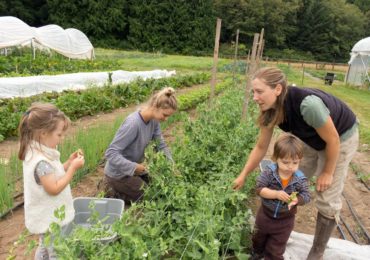 How They Raise Kids and Crops
How They Raise Kids and Crops
Weekday mornings at Around the Table Farm, the kids play in the field with their parents. The couple teaches them to recognize crop plants, weeds and wild native plants, as well as which plants are edible and which are not.
“Wendell is the best tour guide,” Dana Steege-Jackson said. “He loves plants and birds. The chickens are his favorite.”
She adds that he likes to collect eggs and is good at catching the chickens that get out.
“He’ll be able to help with real harvesting in the next couple of years,” she said.
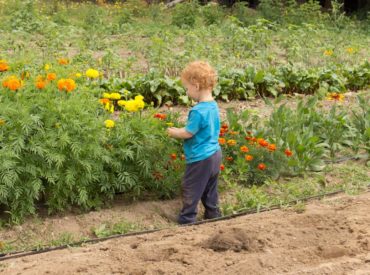 In the afternoons, when the boys nap, the adults work fast and focused. To help with farm work, they have one full-time farm apprentice. Steege-Jackson’s mother babysits on Saturdays during the Poulsbo Farmers Market hours.
In the afternoons, when the boys nap, the adults work fast and focused. To help with farm work, they have one full-time farm apprentice. Steege-Jackson’s mother babysits on Saturdays during the Poulsbo Farmers Market hours.
At Dawn to Dusk Farm, Maia Ostrom still works three days per week as an occupational therapist. On those days, Kavi and Rowan attend preschool and daycare, while their father gets to focus on heavier farm chores and projects.
The Ostroms have two part-time farm employees. In addition to growing a wide array of produce, the family has three horses and raise ducks and Icelandic sheep. This past summer, they had 13 ewes, 21 lambs and one big ram with impressively curly horns.
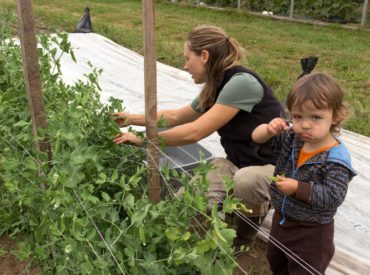 “The kids love doing animal chores with me,” Maia Ostrom said.
“The kids love doing animal chores with me,” Maia Ostrom said.
The couple try to make farming fun for the kids.
“Kavi’s very helpful when we’re doing digging projects,” she said, as Kavi picked up a hoe, doing a very efficient job of scraping the weeds out between rows.
With one preschooler and two toddlers at Full Tilth Farm, Ziemann and Warner are grateful to have Ziemann’s mother spend Fridays at the farm with the children, while they get ready for the Saturday farmers market. A friend of Ziemann’s cares for the children on Tuesdays. Other days, the couple take turns parenting while the other does farm work with the two part-time farm apprentices. They share the apprentices with Laughing Crow Farm on Bainbridge Island.
“It’s a lot of kid wrangling now,” Warner said. “But it’s great for them to grow up here. They get to be outside and explore. All the kids will ask for raw veggies when we’re harvesting.”
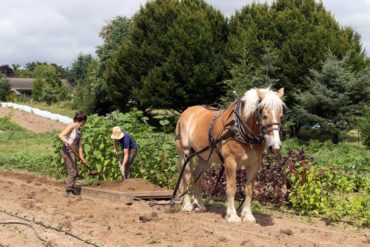 Three-year-old Coretta enjoys putting things in buckets, like kale bunches.
Three-year-old Coretta enjoys putting things in buckets, like kale bunches.
“I think eventually they’ll be able to help us with some picking and weeding,” Ziemann said.
What Drew Them to Farming
The Ostroms each had family history of farming. Although Erik Ostrom’s parents did not farm, the family had been egg farmers on Bainbridge Island dating back to 1910. Maia Ostrom’s grandfather had horses and her mother grew vegetables organically in their front yard in suburban Los Angeles (to the neighbors’ dismay). In college, she studied horse ranch management, animal science and then occupational therapy.
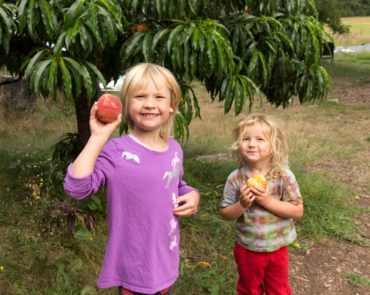 The couple helped farm a piece of his family’s land on Bainbridge for five years. Then they purchased Dusk to Dawn Farm. Maia Ostrom hopes their farm will also become an educational center. She would like to help people learn more about how to grow food without chemicals.
The couple helped farm a piece of his family’s land on Bainbridge for five years. Then they purchased Dusk to Dawn Farm. Maia Ostrom hopes their farm will also become an educational center. She would like to help people learn more about how to grow food without chemicals.
The other four — Ziemann, Warner and the Steege-Jacksons — were each searching for their next career step. They found their way to farming through the Collaborative Apprenticeship Program, which is run though Washington State University Extension.
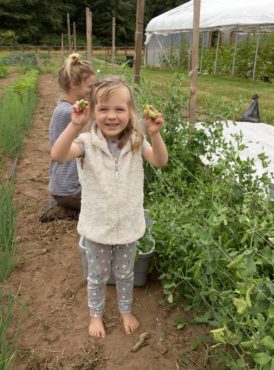 Ziemann and Warner met while doing an apprenticeship in 2010 with two farmers on Bainbridge Island — Betsey Wittick of Laughing Crow Farm and Brian MacWhorter of Butler Green Farms.
Ziemann and Warner met while doing an apprenticeship in 2010 with two farmers on Bainbridge Island — Betsey Wittick of Laughing Crow Farm and Brian MacWhorter of Butler Green Farms.
“And once I started farming, I felt like I didn’t want to do anything else,” said Ziemann, who had previously done environmental education.
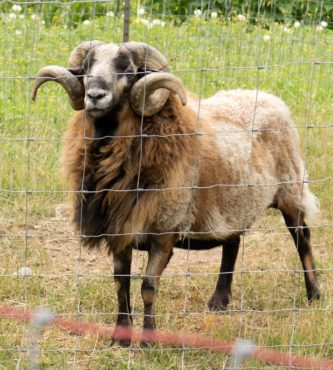 Dana and Aaron Steege-Jackson had apprenticed the previous year with the same two farmers. The experience of being farm apprentices helped them “to realize the importance of mentorship and the multigenerational nature of community,” Aaron Steege-Jackson said. “But also, how our success would not have been possible without our mentor farmers, who continue to support us even now, in our ninth year of this business,” he added.
Dana and Aaron Steege-Jackson had apprenticed the previous year with the same two farmers. The experience of being farm apprentices helped them “to realize the importance of mentorship and the multigenerational nature of community,” Aaron Steege-Jackson said. “But also, how our success would not have been possible without our mentor farmers, who continue to support us even now, in our ninth year of this business,” he added.
Both Around the Table Farm and Full Tilth Farm now host apprentices, who receive housing and a stipend, and earn WSU continuing education credits.
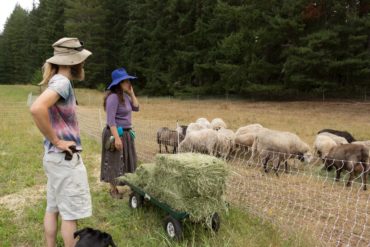 Challenges of Running a Small Farm
Challenges of Running a Small Farm
At the top of the list of farmers’ concerns are changing weather, water and labor costs. Farmers on public water pay high rates as heavy users, and they point out that the Kitsap Public Utility District has no agriculture rate. The farmers with wells deal with issues and limitations around water rights. They all point out that not watering crops in July and August is simply not an option.
Another challenge is finding the time and funding for projects beyond the day-to-day ones of growing crops and tending animals. The Steege-Jacksons said the Kitsap Conservation District helped them access a grant to build a rainwater catchment system and a four-season paddock for their draft horse.
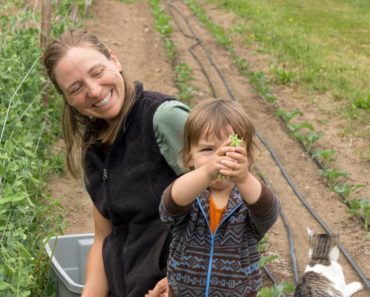 Especially during the busiest months, they say the biggest challenge is the long work hours, and wanting to spend more time with their children.
Especially during the busiest months, they say the biggest challenge is the long work hours, and wanting to spend more time with their children.
Local Farms and Strong Community
Small farms are an important part of the local economy. And local economies, said Aaron Steege-Jackson, “could be a solid part of a solution to some of the problems that ail us as a society, by building relationships between people.”
And indeed, small, local farms strengthen communities in three ways: by building relationships; by providing healthy, fresh food; and by keeping dollars in the community.
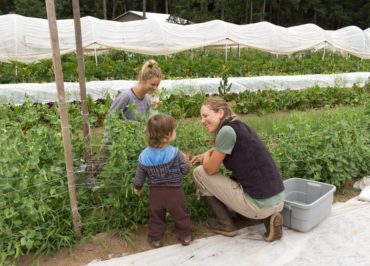 Scott Hall, a longtime farmer and a board member of Kitsap Community and Agricultural Alliance (KCAA), can attest to the strength of support for local farms. KCAA, a nonprofit organization that provides education, resources and advocacy for local agriculture, was one of many stakeholders that helped craft new small-farm-friendly regulations in Kitsap. The result was the county’s first agriculture code, approved in August 2016.
Scott Hall, a longtime farmer and a board member of Kitsap Community and Agricultural Alliance (KCAA), can attest to the strength of support for local farms. KCAA, a nonprofit organization that provides education, resources and advocacy for local agriculture, was one of many stakeholders that helped craft new small-farm-friendly regulations in Kitsap. The result was the county’s first agriculture code, approved in August 2016.
Prior to that, Kitsap had never had any code for agriculture, according to Hall. The new code specifies everything farmers can do, which, Hall said, gives farmers stronger legal footing than a list of “no’s” would have done.
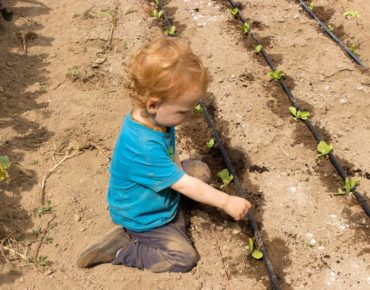 Feeding the Community
Feeding the Community
There are several ways to get local farm-fresh food. With Community Supported Agriculture (CSA) subscriptions, shoppers pay a farmer in advance for a weekly share of produce. Kitsap Fresh is an online farmers market co-op that allows shoppers to select online from items available that week, and then pick up their purchases at a designated place. A state-funded Farm-to-Food-Pantry program provides some grants to small farmers to grow food for local food banks.
Some farmers sell direct from farm stands. But by far, the most fun way to buy from local farmers is at one of the farmers markets.
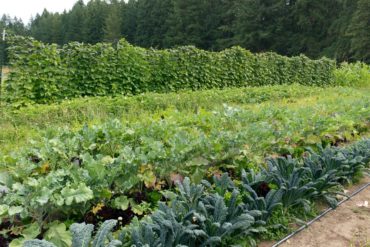 Farmers Markets
Farmers Markets
Farmers markets are festivals that draw people together. In addition to the farmers’ tables that sell everything from vegetables and fruits to eggs and meat, there are prepared food vendors that sell freshly made goodies to eat on the spot. At the Poulsbo market, you can munch on everything from lumpia (spring rolls) and Russian crepes to tamales and bratwurst, artisan breads and local ice cream, to name just a few.
Stroll and sample from several local wineries and a cidery, accompanied by live music. You can shop from artisan producers of pickles, insanely hot barbecue sauce, honey, herbal remedies, soaps, handcrafted wooden items, jewelry and fiber arts, and take home armfuls of gorgeous flowers or a potted shrub or tree for the garden.
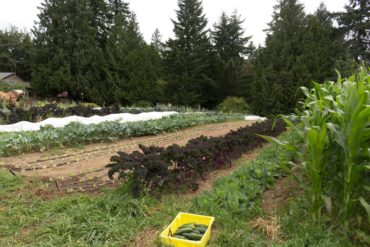 WSU Master Gardeners and a varying group of community service organizations also have booths at the farmers market.
WSU Master Gardeners and a varying group of community service organizations also have booths at the farmers market.
Poulsbo Farmers Market Manager Chris Stover said that the Kitsap Farmers Market Alliance’s website, kitsapgrown.org, lets people see the various locations of the farms and the farmers markets, as well as how far their food is traveling before it ends up in their kitchens.
“All of this is done to show what is available to people in their own communities,” Stover said. “The market is so much more than just a place to buy carrots. The market acts as a place where people can come to just be happy and embrace the amazing place that we get to call home.”
Generation upon generation! Let’s eat to that.




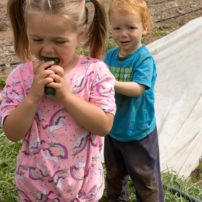
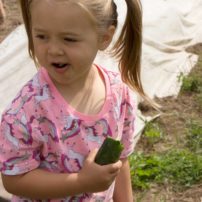
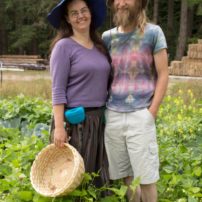
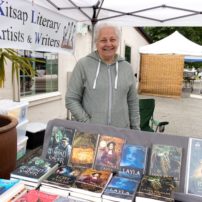
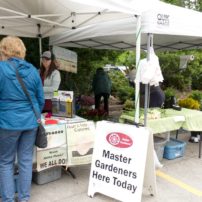
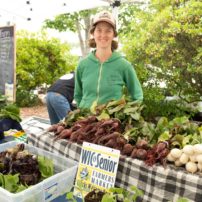
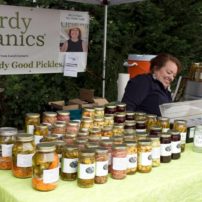
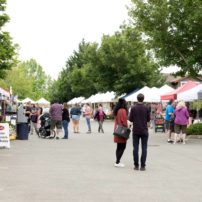
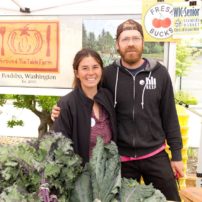
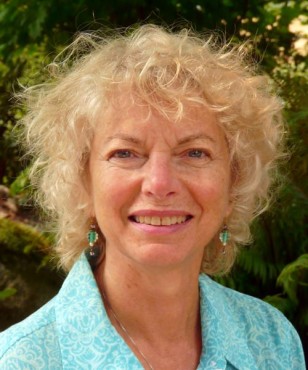





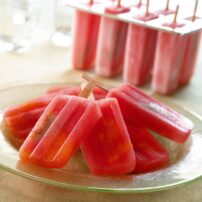






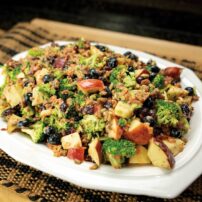










Comments